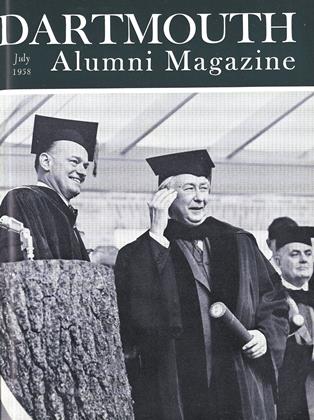THE Dartmouth Medical School has acquired $4,300,000 in new capital in the past year, it was announced in June by Dr. S. Marsh Tenney '44, director of medical sciences at the College.
These funds give a strong start to the Medical School's program for an enlarged faculty, broader curriculum concepts, and improved teaching and research facilities. The program marks what is believed to be the most impressive period of growth in the School's 150-year history.
Included in the grants totaling $4,300,000 are the $1,500,000 gift from the Rockefeller Foundation, announced in last month's issue of the ALUMNI MAGAZINE; a more recent grant of $1,000,000 from the Commonwealth Fund; $1,000,000 from the U.S. Public Health Service; and $8OO,OOO from the Ford Foundation. These gifts are part of the $10,000,000 in new funds being sought by the Medical School for a new medical science building and endowment for the medical faculty, Dr. Tenney said.
The new medical science building will provide for a maximum of 100 students, as compared with present Medical School enrollment of 48 full-time students. Most of the 100 will continue to come from Dartmouth's strong pre-medical group, but an effort will be made to attract students with outstanding undergraduate records from elsewhere.
The full-time, basic medical-science faculty has been increased during the past year from seven to 24 members, and the departments of physiology, under Dr. Tenney, biochemistry, under Dr. Manuel F. Morales, and pharmacology, under Dr. Robert E. Gosselin, have been greatly strengthened. Comparable changes are well advanced in other departments, Dr. Tenney reports.
Changes in the curriculum include closer integration with the basic-science teaching in the College, merging of departmental functions, and the opportunity for supervised research experience.
The aim of the Dartmouth program, Dr. Tenney explains, is to evolve what may become the prototype of a new approach to medical education combining the opportunities of a liberal arts college and a graduate program in the medical sciences. The Dartmouth Medical School will continue to be a two-year medical school, with graduates completing the final two years of clinical studies at leading four-year schools. In making its grant, the Commonwealth Fund expressed the hope that the Dartmouth program might be of "national significance as an experiment in education at a two-year medical school."
In addition to the special gifts derived from the present drive for $110,000,000, which is entirely separate from Dartmouth's current capital gifts campaign, the Medical School receives about $300,000 annually to support research projects being conducted by its clinical and basic- science faculties. These donors have included the National Institutes of Health, the National Science Foundation, the American Cancer Society, the American Heart Association, the Damon Runyon Memorial Fund, the New Hampshire Heart Association, the New Hampshire Trudeau Society, and the Spaulding-Potter Charitable Trusts of Manchester, N.H.
The program of expanding and revising Medical School activities was worked out with the aid of a special policy committee named by the Trustees of the College. The committee consists of Dr. George Packer Berry, dean of Harvard Medical School; Dr. John P. Bowler '15, chairman of the Staff Board of Governors of Mary Hitchcock Hospital; Dr. Robert Loeb, professor of medicine, College of Physicians and Surgeons, Columbia University; Dr. Waltman Walters '17, senior surgeon at the Mayo Clinic; and Dr. William Barry Wood, vice president of Johns Hopkins University.
 View Full Issue
View Full Issue
More From This Issue
-
 Feature
FeatureThe Examined Life
July 1958 By THE REV. THEODORE M. HESBURGH -
 Feature
FeatureThe 1958 Commencement
July 1958 By C.E.W. -
 Feature
FeatureHONORARY DEGREE CITATIONS
July 1958 -
 Feature
FeatureSix Alumni Awards Bestowed
July 1958 -
 Feature
FeatureThe Capital Gifts Campaign To Date
July 1958 -
 Feature
FeatureThe Seniors' Valedictory
July 1958 By JAEGWON KIM '58







